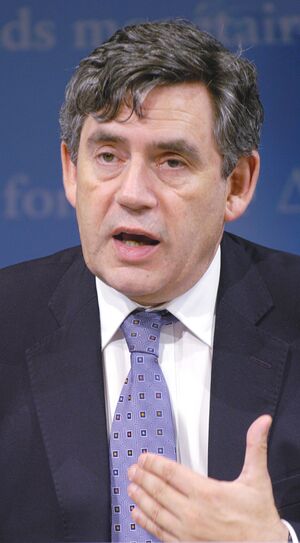Gordon Brown

Gordon Brown (born 20th February 1951) is the current prime minister of the United Kingdom and leader of the governing Labour Party. He is also a Member of Parliament for Kirkcaldy and Cowdenbeath in his native Scotland, and holds a PhD in politics from the University of Edinburgh.[1]
Brown succeeded his political rival Tony Blair as prime minister unopposed in June 2007.[2] Much was made of the differences between the two men, though Brown remains a supporter of the centre-left 'New' Labour ideology in which socialism plays no part. He is said to be slightly more left-wing than Blair,[3] and slightly cooler towards the 'special relationship' between the UK and the USA.[4] However, the two shared a similar outlook over the Iraq War, a conflict Brown supported, and on a more practical level, he has pledged to continue his predecessor's commitment to addressing climate change and international terrorism.[5]
Prior to taking office as premier, Brown served for ten years as the UK's finance minister, the Chancellor of the Exchequer, holding no other office and remaining in the post for longer than any predecessor since the nineteenth century. Those ten years since 'New' Labour was first elected in 1997 were often marked by behind-the-scenes feuding between the so-called 'Brownite' and 'Blairite' camps; in one memorable instance, an anonymous briefing declared Brown "psychologically flawed."[6] More recently, documents appeared in the mass media suggesting that Blair had intended to remove Brown from the Treasury and offer him the post of foreign minister.[7]
Early life, career and family
James Gordon Brown was born in Govan, Glasgow and raised in Kirkcaldy, Scotland by his parents, John and Elizabeth.
Early parliamentary and party career
Brown was elected to parliament on the second attempt in 1983, representing the safe Scottish Labour seat of Dunfermline East. He shared an office with fellow new MP, Tony Blair, who became a friend. Brown was later awarded a post in Neil Kinnock's Labour Opposition party, speaking on trade and industry matters. In 1992, Kinnock's successor as Labour leader, John Smith, made him the party's chief spokesman on financial affairs, the Shadow Chancellor of the Exchequer. Brown would continue to hold this post under the leadership of Tony Blair, swapping the opposition brief for the actual post of Chancellor when Labour achieved a landslide election victory in 1997.
Leadership deal with Tony Blair
Brown was an early contender to lead the Labour Party in 1994 following the sudden death of John smith. However, he made no official moves for the leadership, and ultimately Tony Blair was elected. It has long been claimed that this was the result of a secret deal struck between the pair over a meal at the Granita restaurant in Islington, London - Brown would be given a strong role in Blair's 'New' Labour party, responsible for economic policy, in return for allowing Blair a clear run for the top post. Speculation also exists that Blair promised to step down in a future Labour second term of office, i.e. around 2003, but no-one closely involved has provided a definitive account of this. Brown emerged as a powerful Chancellor, remaining in the post until he reached the leadership in 2007.
Leader of the Labour Party, 2007-
Prime Minister of the United Kingdom, 2007-
First term in office, 2007-
Brown's first months in office were marked by continuing speculation over whether he would call an early general election, both to benefit from an electorate apparently broadly supportive of his leadership, and neutralise his critics' charge that, having taken over from Tony Blair unopposed, his premiership was yet to earn a mandate from the public.[8] Away from political speculation, Brown was forced to confront a number of difficult issues in his first 90 days as Prime Minister, while at the same time developing a range of policy proposals which he would set out at the 2007 Labour Party Conference on 25th September.
Brown's conference speech made reference to both domestic and international tests he had faced in his new office. These included the return of foot and mouth disease to the UK countryside, and the avoidance of terrorist attacks in London and Glasgow. He presented domestic proposals to create more home ownership, crack down on crime through extending stop and search powers, clean up hospitals, and suggested that permitting the serving of alcohol for 24 hours a day could be reviewed. Internationally, he pledged that British forces would remain in Afghanistan and Iraq, and also highlighted Darfur as a foreign policy priority. His reference to "British jobs for British workers" was criticised by the Conservatives, who pointed out that such a policy would contravene European Union law. They also demanded that he keep a manifesto pledge to hold a referendum on the draft EU Constitution, claiming that the new EU Treaty is that in another guise.[9][10]
Footnotes
- ↑ Brown (1982).
- ↑ BBC News: 'Brown is UK's new prime minister.' 27th June 2007.
- ↑ Channel 4 News: 'Brown vs blue on going green.' 12th March 2007.
- ↑ Daily Telegraph: 'Relations will be less special, Washington fears.' 21st May 2007.
- ↑ BBC News: 'Brown pledge to cut state control.' 22nd June 2007.
- ↑ BBC News: 'Civil war that hit New Labour project.' 11th January 1999.
- ↑ Independent on Sunday: 'Revealed: Blair's secret plan to sack Gordon Brown.' 24th June 2007.
- ↑ BBC News: 'Brown 'not ruling out snap poll'.' 23rd September 2007.
- ↑ BBC News: 'I won't let you down, says Brown'. 23rd September 2007.
- ↑ BBC News: 'Cameron fires up the faithful'. 3rd October 2007.
References
- Brown JG (1982) The Labour Party and political change in Scotland, 1918-1929: the politics of five elections. Unpublished PhD thesis, University of Edinburgh.
External links
- 10 Downing Street - official website for the UK prime minister's office
- Timeline: Blair vs Brown - details on the ups and downs of the Blair-Brown partnership, from the BBC